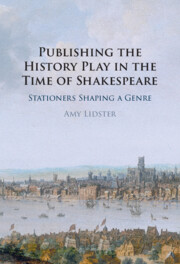Book contents
- Publishing the History Play in the Time of Shakespeare
- Publishing the History Play in the Time of Shakespeare
- Copyright page
- Dedication
- Catalogue
- Figures
- Acknowledgements
- Note on the Text
- Abbreviations
- Introduction
- Chapter 1 ‘True’ Histories
- Chapter 2 Authorizing Histories
- Chapter 3 United Histories
- Chapter 4 Collecting Histories
- Conclusion: ‘A Historie of noble mention’
- Appendix: Plays in Collection, 1560–1659
- Bibliography
- Index
Chapter 1 - ‘True’ Histories
Thomas Creede’s Looking Glasses and the Print Identity of Queen Elizabeth’s Men
Published online by Cambridge University Press: 10 March 2022
- Publishing the History Play in the Time of Shakespeare
- Publishing the History Play in the Time of Shakespeare
- Copyright page
- Dedication
- Catalogue
- Figures
- Acknowledgements
- Note on the Text
- Abbreviations
- Introduction
- Chapter 1 ‘True’ Histories
- Chapter 2 Authorizing Histories
- Chapter 3 United Histories
- Chapter 4 Collecting Histories
- Conclusion: ‘A Historie of noble mention’
- Appendix: Plays in Collection, 1560–1659
- Bibliography
- Index
Summary
Chapter 1 shows how stationers’ strategies directed the publication of early commercial history plays and the reputation of early playing troupes. It concentrates on printer-publisher Thomas Creede and argues that his publishing strategies helped to create a print identity for Queen Elizabeth’s Men as a company that promoted Protestant and Tudor sympathies. While previous studies have tended to assume a correlation between performance and print repertories, this chapter argues that the company’s reputation for specializing in history plays could be a consequence of the publication process. Through a contrastive analysis of his non-dramatic output alongside plays such as The True Tragedy of Richard III, Selimus, and The Famous Victories of Henry V, this chapter suggests that, for Creede, the purpose of ‘history’ (broadly conceived) was to provide exemplary and counter-exemplary models for readers, that could be used to promote England’s and Elizabeth I’s interests. Looking beyond Creede’s output, this chapter argues that the history play occupied a central position in the development of a market for commercial playbooks – especially during a pivotal year, 1594.
- Type
- Chapter
- Information
- Publishing the History Play in the Time of ShakespeareStationers Shaping a Genre, pp. 43 - 85Publisher: Cambridge University PressPrint publication year: 2022

